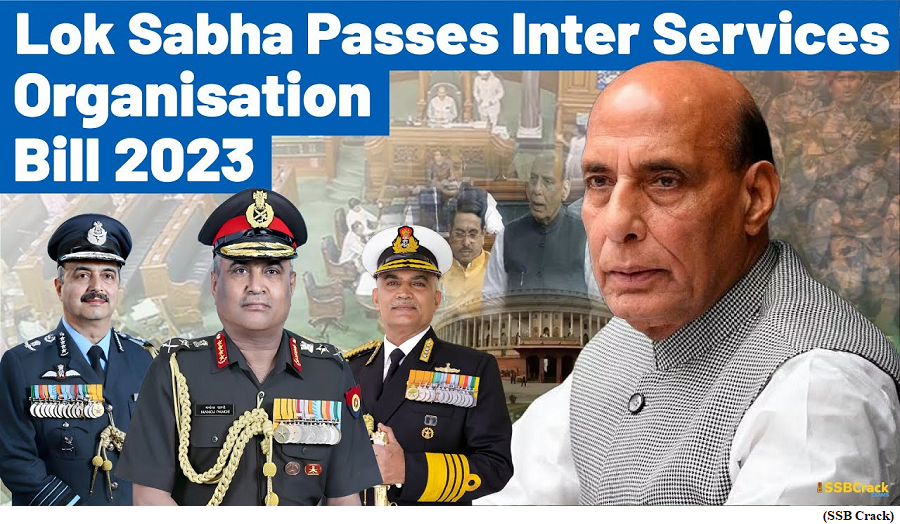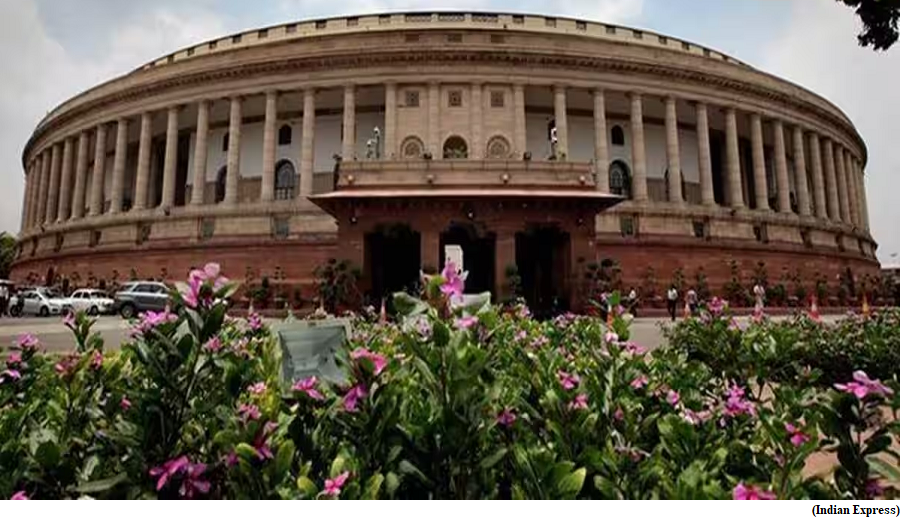Lok Sabha passes Inter-Services Organisation (Command, Control & Discipline) Bill – 2023 (GS Paper 2, Governance)

Why in news?
- The Lok Sabha recently passed the Inter-Services Organisation (Command, Control & Discipline) Bill - 2023.
- The bill seeks to empower Commander-in-Chief and Officer-in Command of Inter-Services Organisations (ISOs) with all disciplinary and administrative powers in respect of the personnel serving in or attached to such organisations.
Details:
- Currently, the Armed Forces personnel are governed in accordance with the provisions contained in their specific Service Acts - Army Act 1950, Navy Act 1957 and Air Force Act 1950.
- The enactment of the Bill will have various tangible benefits such as maintenance of effective discipline in inter-services establishments by the Heads of ISOs, no requirement of reverting personnel under disciplinary proceedings to their parent Service units, expeditious disposal of cases of misdemeanour or indiscipline and saving of public money & time by avoiding multiple proceedings.
- The Bill would also pave the way for much greater integration and jointness amongst the three Services; lay a strong foundation for creation of Joint Structures in times to come and further improve the functioning of the Armed Forces.
Salient Features:
- The ‘ISO Bill - 2023’ shall be applicable to all personnel of regular Army, Navy, and Air force, and to persons of other forces as notified by the Central Government, who are serving in or attached to an Inter-Services Organisation.
- This Bill empowers the Commander-in-Chief, Officer-in-Command or any other officer specially empowered in this behalf by the Central Government with all the disciplinary and administrative powers in respect of personnel serving in or attached to their Inter-Services Organisations for the maintenance of discipline and proper discharge of their duties, irrespective of the service to which they belong.
- The Commander-in-Chief or the Officer-in-Command means General Officer/Flag Officer/Air Officer who has been appointed as Commander-in-Chief of Officer-in-Command an Inter-Services Organisation.
- To maintain Command and Control in absence of the Commander-in-Chief or the Officer-in-Command, the officiating incumbent or the officer on whom the command develops in absence of a C-in-C or Oi/C, will also be empowered to initiate all disciplinary or administrative actions overs the service personnel, appointed, deputed, posted or attached to an Inter-Services organisation.
- The Bill also empowers the Commanding Officer of an Inter-Services organisation to initiate all disciplinary or administrative actions over the personnel appointed, deputed, posted or attached to that Inter-Services Organisation. For the purpose of this Act, Commanding Officer means the officer in actual command of the unit, ship or establishment.
- The Bill empowers the Central Government to constitute an Inter- Services Organisation.
Enabling act:
- The ISO Bill, 2023 is essentially an enabling act and it does not propose any change in the existing service acts/rules/regulations which are time-tested and have withstood judicial scrutiny over the last six decades or more.
- Service personnel when serving in or attached to an ISO will continue to be governed by their respective service acts.
Money Bills vs Finance Bills, What are the differences, what the court has ruled
(GS Paper 2, Polity and Constitution)
Why in news?
- The Digital Personal Data Protection (DPDP) Bill is a normal Bill and not a Money bill, Parliamentary Affairs Minister held recently.
- Earlier, it was reported that Bill was being introduced under Article 117 of the Constitution, which deals with special provisions for Finance Bills.

What is a Finance Bill?
- Any Bill that relates to revenue or expenditure is a Financial Bill. A Money Bill is also a specific type of Finance Bill that must deal only with matters specified in Article 110 (1) (a) to (g).
- Article 117 of the Constitution deals with the special provisions relating to Financial Bills.
- Article 117 (1) indicates that a Bill that makes provision for any of the matters specified in clauses (a) to (f) of Article 110 (1) can be introduced or moved only on the President’s recommendation and cannot be introduced in the Rajya Sabha. Examples of this first category of Financial Bills are Money Bills and other Financial Bills originating solely in the Lok Sabha.
Finance Bills II:
- The second category of Finance Bills is dealt with under Article 117 (3) of the Constitution. Such Bills are more like ordinary Bills.
- The difference between this kind of Financial Bill and an ordinary Bill is that if the former is enacted, it will involve expenditure from the Consolidated Fund of India and cannot be passed by either House unless the President has recommended its consideration.
- In all other respects, such Financial Bills are just like ordinary Bills, and can even be introduced in the Rajya Sabha, amended by it, or be subjected to deliberation by both Houses in a joint sitting.
- A Financial Bill becomes a Money Bill when it exclusively falls under one of the seven heads listed under Article 110(1), which defines Money Bills. Moreover, a Money Bill is a Financial Bill that is certified by the Speaker.
What is the difference between Money Bills and Financial Bills?
- Article 110 defines a “Money Bill” as one containing provisions dealing with taxes, regulation of the government’s borrowing of money, and expenditure or receipt of money from the Consolidated Fund of India, among others, whereas Article 109 delineates the procedure for the passage of such a Bill and confers an overriding authority on the Lok Sabha in the passage of Money Bills.
- A major difference between money and Financial Bills is that while the latter has the provision of including the Rajya Sabha’s (Upper House) recommendations, the former does not make their inclusion mandatory. The Lok Sabha has the right to reject the Rajya Sabha’s recommendations when it comes to Money Bills.
- While an ordinary Bill can originate in either house, a Money Bill can only be introduced in the Lok Sabha, as laid down in Article 117 (1).
- Additionally, no one can introduce or move Money Bills in the Lok Sabha, except on the President’s recommendation. Amendments relating to the reduction or abolition of any tax are exempt from the requirement of the President’s recommendation.
- The two prerequisites for any financial Bill to become a Money Bill are that first, it must only be introduced in the Lok Sabha and not the Rajya Sabha. Secondly, these bills can only be introduced on the President’s recommendation.
How are money and Financial Bills passed?
- The role of the Rajya Sabha in passing Money Bills is restricted. Such Bills can originate only in the Lok Sabha. After being passed by the Lok Sabha, Money Bills are sent to the Rajya Sabha for its recommendations.
- Within 14 days, the Upper House must submit the Bill back to the Lower House with its non-binding recommendations. If the Lok Sabha rejects the recommendations, the Bill is deemed to have passed by both Houses in the form in which it was passed by the Lok Sabha without the recommendations of the Rajya Sabha.
- Even if the Rajya Sabha doesn’t respond with its recommendations within 14 days, the same consequences would follow. Thus, when it comes to Money Bills, the Rajya Sabha only has a recommendatory role.
- Meanwhile, ordinary Bills and other Financial Bills still require the agreement of both Houses of Parliament to ensure their passage. They can very well be rejected or amended by the Rajya Sabha, unlike Money Bills.
Joint sitting:
- Also, all other Financial Bills, separate from Money Bills, must go through the rigours of all stages in the Rajya Sabha as ordinary Bills. This means that while the President can summon a joint sitting of both Houses to resolve differences over a deadlock in passing an ordinary Bill, there is no provision for a joint sitting for differences over a Money Bill.
- Over the last seven years, the government has introduced multiple legislations through the Money Bill route, the most notable of which are the Aadhaar Act, 2016, and the Finance Act, 2017.
What is the top court’s view?
- In November 2019, a five-judge Constitution Bench, headed by the (then) Chief Justice of India Ranjan Gogoi, struck down amendments to the 2017 Finance Act, which was passed as a Money Bill, altering the structure and functioning of various tribunals.
- Directing the formulation of fresh norms for appointing tribunal members, the bench, ruled that the amendments were “contrary to the principles envisaged in the Constitution as interpreted by this Court”.
- However, on the issue of whether the amendments could have been passed as a Money Bill, the court referred the matter to a seven-judge bench for consideration.
- It also expressed its doubts over the correctness of the Constitution Bench’s 2018 verdict upholding the 2016 Aadhaar Act, which was passed as a Money Bill too.
- Incidentally, CJI Chandrachud had been the lone dissenter in the Aadhaar ruling of 2018, criticising the government for passing the Aadhaar Act as a Money bill while calling it a “fraud on the Constitution”.



